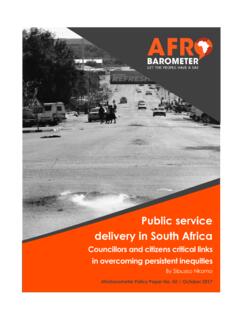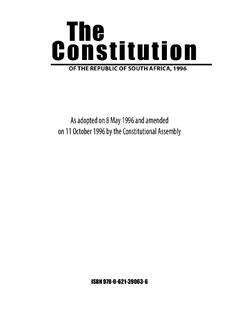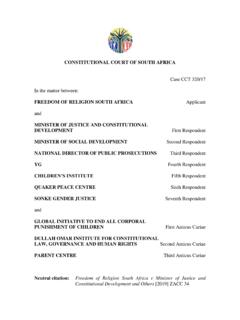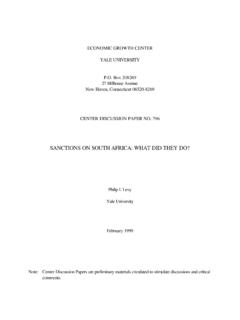Transcription of Constitutionalism and the Judiciary: A Perspective from ...
1 Constitutionalism and the Judiciary: A Perspective from Southern africa Rizine R. Mzikamanda NOTE: This paper, with its abbreviated references, is circulated for discussion purposes only. It is not to be quoted without prior permission of the author. Introduction The countries in Southern africa forming the Southern africa Development Community (SADC)1 include Angola, Botswana, Democratic Republic of Congo, Lesotho, Malawi, Madagascar, Mauritius, Mozambique, Namibia, south africa , Seychelles, Swaziland, Tanzania, Zambia and Zimbabwe. They have a lot in common. Most of them were colonized by western powers before they attained self-rule. In recent times these countries adopted progressive and democratic constitutions during what has frequently been described as the third wave of democratization. However, for most of them attaining democratic dispensation and adopting democratic constitutions has proved to be the easier part.
2 The most difficult part has been entrenching Constitutionalism , sometimes giving a paradox of constitutions without Constitutionalism . There are fears that the democratic gains of the first decade of democratization are eroding at an alarming rate. The euphoria that accompanied the third wave of democratization is on the wane, and with it the prospects of entrenched Constitutionalism . Constitutionalism in Southern africa today leaves us with more questions than answers. How are these difficult questions going to be answered? Is it through a robust law reform agenda or through a strong and independent judiciary that plays a central role in Constitutionalism ? What about other role players; do they demonstrate a commitment to Constitutionalism ? This paper laments the apparent rise and fall of Constitutionalism in Southern africa and wonders what the prospects for the future are. The paper expresses the view that the judiciary has a central role to play in providing appropriate enforcement mechanisms for Constitutionalism .
3 Yet the ruling elite appear to be narrowing the scope of the role of the judiciary by the day. There appear to be deliberate attempts by the ruling elite to weaken and alienate the judiciary in the minds of society in so far as the running of government affairs is concerned. Recently the operations of the SADC Tribunal were suspended by Summit, the political organ of SADC. The suspension of the SADC Tribunal, the judicial organ of the regional grouping, is quite telling. Among other things, it demonstrates how disregard for the rule of law at national level can manifest itself at the regional level through influential members of the regional grouping. LLM(UK), LLB(HONS)(MW), Judge President of the High Court of Malawi, Lilongwe, Paper for presentation at a Conference for Law Reform Agencies for Eastern and Southern africa on The Role of Law Reform in Constitutionalism , Rule of law and Democratic Governance , Lilongwe, Malawi, 7-11 November, 2011.
4 1 SADC has a membership of fifteen countries. Nonetheless the paper recognizes that there remains a glimmer of hope when some countries like south africa remain a shining example for the Southern africa region, and beyond, regarding commitment to tenets of Constitutionalism through support for a well-functioning and respected Constitutional Court. south africa provides useful lessons on transformative Constitutionalism which goes beyond discourse among constitutional experts and the elite, but cascades down to ordinary citizens especially through upholding of economic, social and cultural rights. south africa appears to lead by example and to resist any bad influence from some influential members of the Southern africa region of eroding the rule of law and decelerating the entrenchment of Constitutionalism in the region. The constitution A constitution of a country is the organic and fundamental law of the country or state, establishing the character and conception of its government and laying down the basic principles to which its internal life is to be conformed.
5 As a set of rules governing a state and the supreme law upon which a state is founded, it embodies the rights of the people. All other laws of the country derive their validity from it. A country s constitution spells out how the functions of its different departments or organs are to be distributed and limited. A constitution is sometimes described as a mirror reflecting the national soul; the identification of the ideals and aspirations of a nation and the articulation of the values binding its people, while ensuring that government never oversteps its mandate as provided for in the constitution . A constitution must reflect the social and political development of a nation and must diminish friction in the political machinery. Thus a constitution is regarded as a living instrument capable of growth. The courts must breathe life into the constitution from time to time. A state without a constitution is a failed state.
6 I would suggest that a state whose constitution is undermined or not respected by the very people whom it binds is a failed state. A constitution represents the will of the people and must be characterized by a representative and responsive government, especially in Southern africa where the majority are illiterate, poor and politically inexperienced. Such people must never be taken advantage of and manipulated by the ruling elite who seek to serve their own interests. The countries of Southern africa adopted progressive and democratic constitutions at the dawn of multi-party democracy that swept the entire continent in the 1980s and 1990s. Each of such constitutions incorporated the principle of separation of powers, the rule of law, protection of human rights and tenets of democratic governance, among many other principles. Indeed principles of an open and accountable government were entrenched.
7 The judiciary was given the responsibility of interpreting and enforcing the constitution in an independent and impartial The judiciary is the guardian of the constitutions with respect to all the constitutions of the countries of Southern africa . The independence of the judiciary is guaranteed. The judiciary has the power of judicial review provided for in the constitutions. This is the power to review any action of the state organs and any law for its conformity with the constitution and to declare any action or law invalid to the extent of its inconsistency with the constitution . The judiciary is as much subject to the constitution and the law as is any other organ of state or government. 2 Section 9 of the Republic of Malawi constitution is an example. The importance of the constitution cannot be overemphasized. National constitutions play an important role in building and guiding democracies.
8 Modern and progressive constitutions have become transformative in nature, providing socio-economic tools to address transformative issues in emerging Constitutionality Constitutionality is the state of conforming to a given constitution . It refers to something relating to or controlled by the constitution . All laws of a country must draw their validity from the constitution if they are to be constitutional. Similarly all governmental action, executive, legislative or judicial, must draw their validity from the constitution , otherwise they will be unconstitutional and declared invalid. The supremacy of the constitution entails that all governmental action must remain within the confines of the constitution and no government should act outside the constitution or set itself above the constitution , otherwise it will be acting unconstitutionally. A constitution must be interpreted as a whole and no part of it must ever be interpreted so as to abrogate another part.
9 Rather, every provision of the constitution must be interpreted in such a way that it complements and support the other provisions. For this reason I seriously doubt if any provision of a given constitution can ever be said to be unconstitutional, vis- -vis the same constitution . The idea of constitutionality is viewed as a way of checking the validity of the law or governmental action in accordance with the letter of the law. Thus the emphasis in constitutionality is on formal validity. There continues to be a debate in relation to the constitutions of most of the Southern African states, which debate borders on questioning the validity of the constitutions themselves. This debate is engaged in despite that the constitutions have been widely acclaimed to be good and progressive democratic constitutions. The debate is rooted in constitution -making processes which some scholars argue were flawed.
10 It is often argued that these constitutions which bear close resemblance were hurriedly adopted during the euphoria of change from autocratic rule to democracy. They were adopted in a copy and paste and pure conformist fashion to meet demands of western governments. The argument goes on to suggest that the constitutions mostly contain western notions and values of democracy and good governance , with little or nothing of African cultural values and the idea of African democracy. Consultations before the adoption of the constitutions were limited and for the most part excluded civil society and the general population whose constitution it was meant to be. This debate though not concluded, has had serious consequences on Constitutionalism in Southern africa . To begin with the commitment to constitutionality and Constitutionalism among the ruling elite becomes less apparent. The ruling elite put this up as justification for ignoring some constitutional provisions or even for crying foul.

















